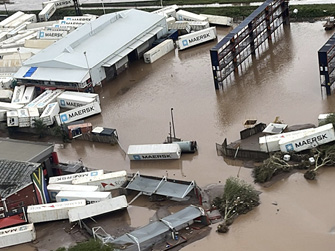(GIN)—Record-breaking levels of rainfall threaten a new round of flooding and landslides in South Africa’s KwaZulu-Natal. Already, the calamity has taken over 400 lives, left some 40,000 homeless, with an economic cost yet to be tallied.
Weather forecasters and climate scientists, speaking to the Daily Maverick news outlet, are predicting a repeat of such events—potentially sooner than expected.
“The events of the past week in KwaZulu-Natal have brought into sharp focus the material threat posed by extreme weather and climate change,” observed the local media outlet. Forecasters from the South African Weather Service (SAWS) affirmed that “the exceptionally heavy rainfall overnight and this morning exceeded even the expectations of the southern African meteorological community at large.”
The floodwaters—the strongest to have struck KwaZulu-Natal in recent memory—smashed into Durban city and surrounding areas, trashing the idyllic beaches with debris.

“The loss of life, destruction of homes, the damage to the physical infrastructure … make this natural disaster one of the worst ever in recorded history of our province,” said Sihle Zikalala, premier of the KwaZulu-Natal province.
The floods also brought landslides that destroyed roads and homes in the region. Lower floors of seaside holiday apartments along the north coast were buried by reddish-brown mud, while hillside homes hung precariously after their foundations were washed away.
Shanty towns built along rivers were among the most vulnerable, and shack homes were washed away by floodwaters or covered by mud and debris, causing blame to be placed on the government itself, for inequitable access to basic services “exacerbating the injustice,” said Debra Roberts, co-chair of a major report on climate impacts.
Insurance is one way for communities to recover from severe flooding but people living in shanties do not have access to this. “They literally lost everything,” she said. “Many have lost absolutely all the material goods that they have in this world including their house today.”
The government has announced an immediate $68 million in emergency relief funding.













